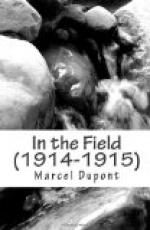I turned and went away, quietly and slowly, with a feeling of oppression.
So I made my way back again, skirting the firing line behind the ridge, often obliged to pull up to allow troops to pass to reinforce the line. Now and then it seemed that the fighting had ceased at the spot I happened to be in, but I soon found myself again in the thick of the artillery and rifle fire. On all the roads I crossed there was a continual stream of wounded men limping along and stretcher-bearers carrying mutilated bodies. The heat had become tropical. It was nearly twelve o’clock. My head began to swim. My shako seemed gradually to get tighter and to press on my temples till they were ready to burst. I thought I should never find my regiment—never....
I came to a small village, and decided to stop and get some food for ourselves and for my horses, as they showed signs of distress. There, too, the streets were full of infantry, but, to my astonishment, none of them belonged to any of the regiments of my Corps. So I supposed I had passed its left wing without knowing it. Bad luck! I rode up the steep alleys, looking for some inn where I could put up, but all the inns were filled with hot, footsore soldiers, who seemed thankful for a moment’s rest. They were sitting about wherever there was any shade to be found. With their coats unbuttoned, their neckties undone and shirts open, they were trying to recover their vigour by greedily devouring hunks of bread they had in their wallets, spread with the contents of their preserved meat tins.
At the door of the vicarage, near the pretty little church which could be seen from the surrounding country, I saw an old priest who was distributing bottles of white wine to an eager crowd of troopers. I heard him say in a gentle voice:
“Here, my lads, take what there is. If the Prussians come, I don’t want them to find a drop left.”
“Merci, ... merci, Monsieur le Cure.”
All at once there was a frightful explosion quite close to us, which made the whole church-square quiver. A German “coal-box” had fallen on to the roof of the church, making an enormous hole in it, out of which came a thick cloud of horrible yellow smoke. A shower of wreckage fell all around us and made a curious noise. The windows of all the houses came clattering down in shivers. In a twinkling the little square in front of the vicarage was empty. A few men who were wounded fled moaning. The rest slung their rifles and went off quickly in a line close under the shelter of the houses. I was left alone face to face with the white-haired priest who still held a bottle of golden wine in his hand. We looked at each other greatly distressed.
“Tenez, Monsieur l’Officier,” he said suddenly; “take some more of this. I am going to break all the remaining bottles, so that they shall not drink any of it.... Ah! the savages! Ah! the wretches!... My church!... My poor church!...”




